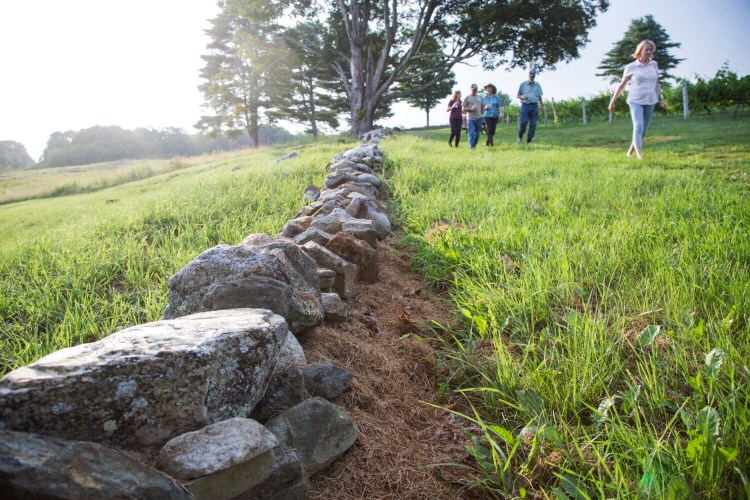The 15-year-old Savage Oakes Vineyard & Winery in Union, which helped pioneer growing wine grapes in Maine, is for sale.
The beautiful 50-acre property is listed by RE/MAX at just under $1.5 million and includes the property’s tasting room, commercial kitchen, 1790s barn, four acres of grapes, 200-year-old six-bedroom home, wild blueberry fields, tractors, tents and business name.
Holly and Elmer Savage have owned the mostly solar-powered property for 20 years (previously, it belonged to his parents) and have been growing grapes and making wine there for 15 of those years. They also keep a herd of belted galloway cattle, sell beef and host events seasonally, including weddings, Maine’s Wild Blueberry Festival, the Maine Cheese Festival and – since 2015 – an impressive array of big-name outdoor concerts in the summer. All were canceled this year because of the pandemic.
But Elmer Savage said the pandemic is only part of the reason the couple decided to sell; mostly, COVID-19 pushed up their timetable.
“We’re not old, but we’re getting there, and it’s time to start to do something different,” he said. Elmer Savage is 57, and the couple has two college-age sons. “It was in our five-year horizon to do something. The timing is right. We’ve done what we wanted to do. We’ve proven we could grow grapes when a lot of people said you couldn’t. We grew the grapes. We made the wine. I’m satisfied with what we’ve done.”
Most Maine wineries import grapes or juice from elsewhere – including New York and Washington state – in order to make wine because there are limited varietals that can withstand the climate here. Savage Oakes was unusual in that it sold estate-grown wine. Joe Appel, former wine buyer for Rosemont Markets and former wine columnist for the Portland Press Herald, visited the winery last year. “We were really impressed with their grape growing, how they have their vineyards laid out and the different cold-hardy varieties they were experimenting with,” he said.
The hot real estate market in Maine, combined with the effort that would be required to re-start the concert business, moved up the couple’s plans to sell, Elmer Savage said. The property has been on the market for about one week.
“We did have quite a locomotive going with the concerts, and everybody knew their job,” he said. “It was kind of a well-oiled machine. It’s going to take a little bit to get it going again. And who knows when it will start again?”

People line up at the wine tent during intermission of the Graham Nash concert at Savage Oakes Vineyard in 2017. Derek Davis/Staff Photographer
The Savages had hoped their sons would take over the venture – Elmer Savage described that as “the No. 1 most desirable plan” – but he said the boys have their own dreams, the enterprise is very complicated for young people to run, and it’s expensive, to boot. He hopes the buyer will continue the winery and events business. “This business is profitable as is or it is ready to be taken to the next level if so desired,” the real estate listing says.
“We’re tired. It’s not been an easy summer,” Savage said. The winery has been open Fridays, Saturdays and Sundays only, for flights and glasses of wine to be enjoyed outside. It has also offered curbside pickup. Because of the sun and heat this summer, this year’s grape harvest will be early, and Elmer Savage, who is the winemaker, intends to bottle wine. The couple sells eight varieties on their website, ranging from $16 to $23 per bottle, with Maine-evocative names like Ruffed Grouse, Come Spring and Georges River.
Elena Morrow-Spitzer, former owner of Maine’s Pantry on Commercial Street in Portland, used to sell Savage Oakes wines. “It’s really good wine,” she said. “I used it a lot in my gift baskets because people wanted Maine wines, but of course they wanted something that would taste good, too.”
Elmer Savage said that once he and his wife had made their decision to sell the winery, it felt right. “Yeah, it’s bittersweet, but it’s also kind of a relief,” he said. “After we spent our time building it up, I don’t think it’s what anybody really wants to do – sell the business – but it’s a valuable asset and ultimately if we’re going to retire, that’s what it means.”
They plan to move, with the cows, to a smaller farm just up the road that they own. They own a few properties that they want to remodel, but other than that have no immediate future business plans, he said. He added that if the Savage Oakes does not sell, they will keep the business going.
Comments are not available on this story.
Send questions/comments to the editors.


